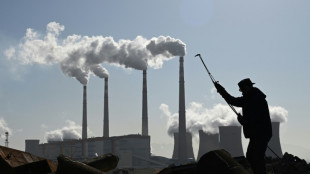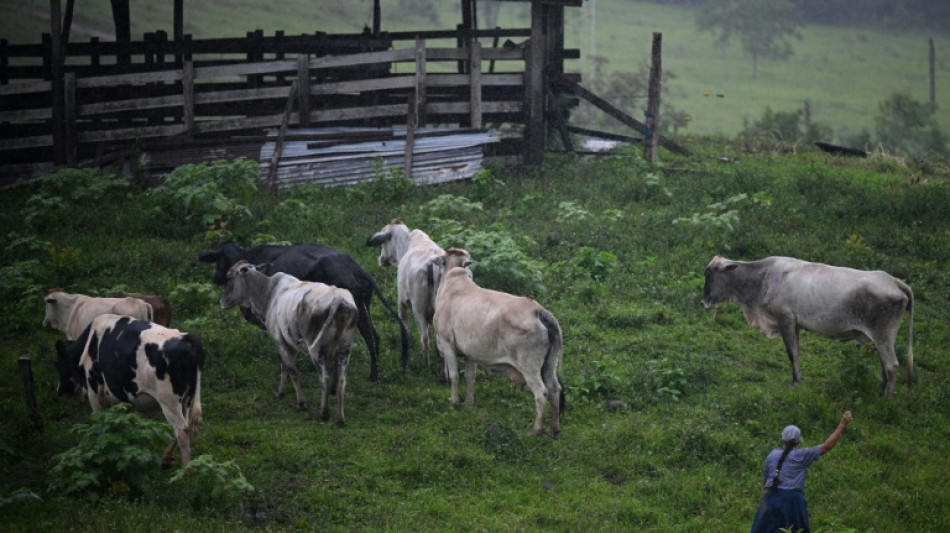
-
 Lessons and liquids: buried alive in Myanmar's earthquake
Lessons and liquids: buried alive in Myanmar's earthquake
-
Trump tariffs spark fears for Asian jobs, exporting sectors
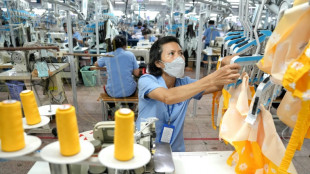
-
 Stocks and dollar sink, havens rally as Trump tariffs fan trade war
Stocks and dollar sink, havens rally as Trump tariffs fan trade war
-
Runners fly to North Korea for first post-Covid Pyongyang Marathon
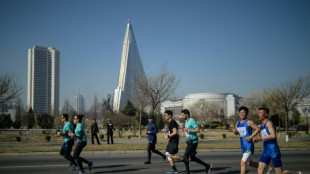
-
 Hamilton rubbishes claims he's lost faith in Ferrari
Hamilton rubbishes claims he's lost faith in Ferrari
-
Nintendo Switch 2 sparks excitement despite high price

-
 Sri Lanka's crackdown on dogs for India PM's visit sparks protest
Sri Lanka's crackdown on dogs for India PM's visit sparks protest
-
S Korea police raise security levels ahead of impeachment verdict

-
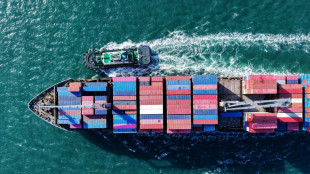 China vows 'countermeasures' to sweeping new US tariffs
China vows 'countermeasures' to sweeping new US tariffs
-
Trump jolts allies, foes and markets with tariff blitz
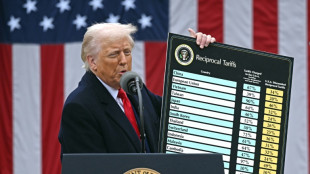
-
 France says EU to target US online services after Trump tariffs
France says EU to target US online services after Trump tariffs
-
Tsunoda vows to bring 'something different' after Red Bull promotion

-
 Verstappen not happy with Tsunoda-Lawson Red Bull swap
Verstappen not happy with Tsunoda-Lawson Red Bull swap
-
Experts accuse 54 top Nicaragua officials of grave abuses

-
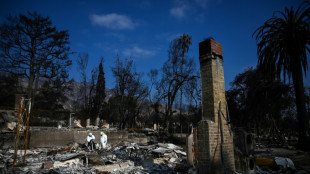 Remains of 30th victim of Los Angeles fires found
Remains of 30th victim of Los Angeles fires found
-
EU to target US online services after Trump tariffs: France

-
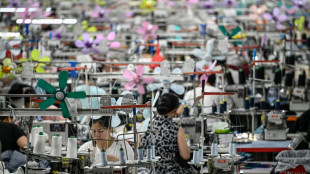 How Trump's 'liberation day' tariffs will impact China
How Trump's 'liberation day' tariffs will impact China
-
Malaysia suspends search for long-missing flight MH370

-
 Search for long-missing flight MH370 suspended: Malaysia minister
Search for long-missing flight MH370 suspended: Malaysia minister
-
Europe hits out at Trump tariffs, keeps door open for talks
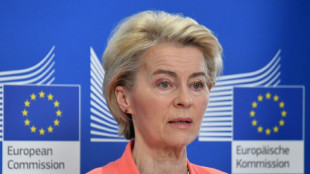
-
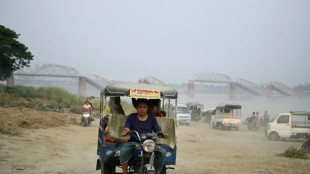 Myanmar's junta chief to head to Bangkok summit as quake toll surpasses 3,000
Myanmar's junta chief to head to Bangkok summit as quake toll surpasses 3,000
-
Lawson vows to prove he belongs in F1 after shock of Red Bull axing

-
 Australia sweats through hottest 12 months on record: official data
Australia sweats through hottest 12 months on record: official data
-
Livestock theft is central to jihadist economy in west Africa
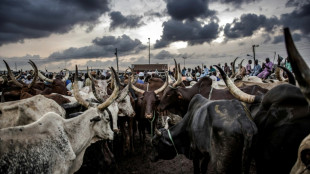
-
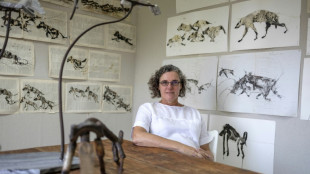 South African artist champions hyenas in 'eco-queer' quest
South African artist champions hyenas in 'eco-queer' quest
-
Danish PM in 'unity' Greenland visit amid US takeover threats
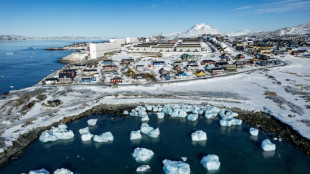
-
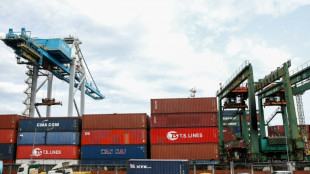 Taiwan says US tariffs 'highly unreasonable'
Taiwan says US tariffs 'highly unreasonable'
-
Lawson says ruthless Red Bull axing was 'tough to hear'

-
 Heat humble Celtics for sixth straight win, Thunder roll on
Heat humble Celtics for sixth straight win, Thunder roll on
-
Trump escalates trade war with sweeping global tariffs
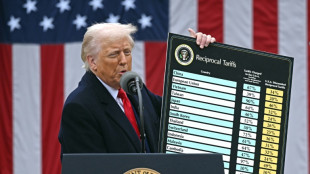
-
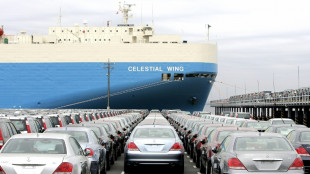 Japan says US tariffs 'extremely regrettable', may break WTO rules
Japan says US tariffs 'extremely regrettable', may break WTO rules
-
South Koreans anxious, angry as court to rule on impeached president
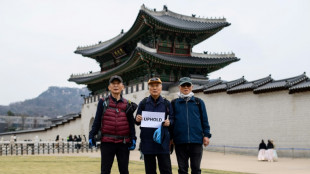
-
 Juve at in-form Roma with Champions League in the balance
Juve at in-form Roma with Champions League in the balance
-
Injuries put undermanned Bayern's title bid to the test

-
 Ovechkin scores 892nd goal -- three away from Gretzky's NHL record
Ovechkin scores 892nd goal -- three away from Gretzky's NHL record
-
Australian former rugby star Petaia signs for NFL's Chargers

-
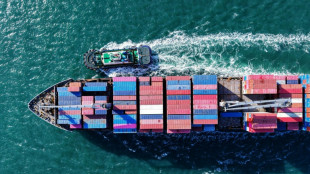 China says opposes new US tariffs, vows 'countermeasures'
China says opposes new US tariffs, vows 'countermeasures'
-
Athletics world watching as 'Grand Slam Track' prepares for launch

-
 Heat humble Celtics for sixth straight win, Cavs top Knicks
Heat humble Celtics for sixth straight win, Cavs top Knicks
-
Quake-hit Myanmar's junta chief to head to Bangkok summit
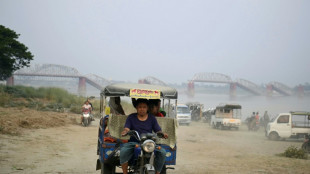
-
 New Spielberg, Nolan films teased at CinemaCon
New Spielberg, Nolan films teased at CinemaCon
-
Shaken NATO allies to meet Trump's top diplomat

-
 Israel's Netanyahu arrives in Hungary, defying ICC warrant
Israel's Netanyahu arrives in Hungary, defying ICC warrant
-
Shiny and deadly, unexploded munitions a threat to Gaza children
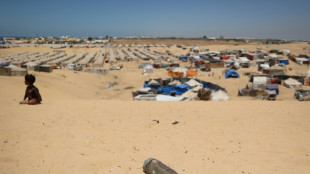
-
 Stocks tank, havens rally as Trump tariffs fan trade war
Stocks tank, havens rally as Trump tariffs fan trade war
-
Altomare hangs on to tie defending champ Korda at LPGA Match Play

-
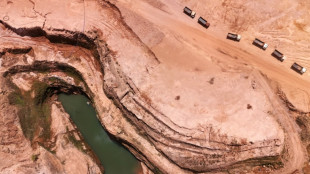 Paraguay gold rush leaves tea producers bitter
Paraguay gold rush leaves tea producers bitter
-
Health concerns swirl as Bolivian city drowns in rubbish

-
 Syria says deadly Israeli strikes a 'blatant violation'
Syria says deadly Israeli strikes a 'blatant violation'
-
Financial markets tumble after Trump tariff announcement
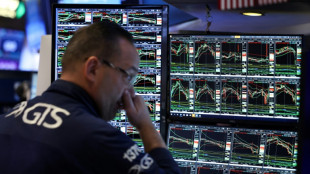

Turning over a new leaf, Colombian ranchers plant trees
In Colombia's southern Guaviare department, on the doorstep of the Amazon, cattle ranchers are engaged in a practice that belies their jungle-wrecking reputation. They plant trees.
Under an experiment started in 2020, dozens of Guaviare farmers have moved their cattle to smaller enclosures and implemented rotational pasture, returning vast swathes of land to nature and replanting lost forest.
"The forest is cared for because we are no longer cutting down trees," milk farmer Olga Martinez, 65, told AFP.
The area was populated in the late 20th century by an influx of settlers attracted by the promise of "a land without men for men without land."
Martinez herself first arrived in Guaviare some 45 years ago, when the landscape was "mountainous jungle."
She and others soon changed that, clearing vast tracts of rainforest for pasture and cropland.
From the air, it is clear to see the human expansion taking huge bites out of the thick vegetation surrounding San Jose de Guaviare, the departmental capital.
But a change is taking root.
Martinez and 34 other Guaviare farmers have signed up to a conservation program managed by France's ONF government forest agency and its local branch, ONF Andina.
Since last year, she has planted some 1,200 trees on her 55-hectare (135 acre) property without having to give up a single head of cattle.
The benefits have been manyfold.
"The cows give more milk, they have gained weight, the calves are beautiful," she said of the new practice of feeding cows in one pen until the grass is exhausted, then move them to the next and so on while the first recovers.
"That filled me with joy. The cattle in those large pastures do nothing but run. They don't even eat" because they trample the grass, she said.
- From deforestation to reforestation -
Cattle farmers like Martinez receive trees to plant as part of the project called Terramaz, as well as advice and equipment to get the most out of their herds.
While ranches in Guaviare are used to supporting about 0.8 cattle per hectare, participants in the Terramaz program have increased the ratio to 3.5 head per hectare, according to the ONF -- still considered ample roaming space.
So far, the project has reclaimed 915 hectares of farmland.
Colombia has about 30 million head of cattle earning 1.7 percent of its GDP -- double what coffee generates, according to industry statistics.
"Extensive livestock farming is one of the main drivers of deforestation in our department," said Xismena Martinez of the Guaviare governor's office.
"The model consisted of cutting the forest to plant pasture... it is a very profitable activity," she said.
The department lost some 25,000 hectares of forest in 2021, according to official statistics.
Rainforests are often called the "lungs of the Earth," soaking up planet-warming CO2 and expelling life-giving oxygen. Their protection is crucial in the battle to combat climate change.
- 'They walk less' -
Nelcy Rodriguez, 49, is another project volunteer who has seen her herd's productivity increase.
"Because they walk less," she said, her 10 cows now give about 55-60 liters (14.5-15.8 gallons) of milk per day compared to 40 liters before.
About 15 hectares of Rodriguez's 48-hectare farm have been reforested.
The Guaviare area -- remote and largely forgotten -- has long been popular with farmers of illegal coca -- the main ingredient in cocaine of which Colombia is the world's biggest exporter.
But as the so-called war on drugs ramped up, coca plantations were targeted by an aggressive glyphosate fumigation campaign, and many farmers turned to cattle.
"I used to plant coca," said Rodriguez, and used the money to buy cows.
"When there was no more coca, I had my cows and I started farming."
She and many others have undergone a complete mind shift along the journey, said Rodriguez.
Nowadays, "one is sorry to fell a tree," she said. "On the contrary, we are working hard to reforest."
T.Ward--AMWN
